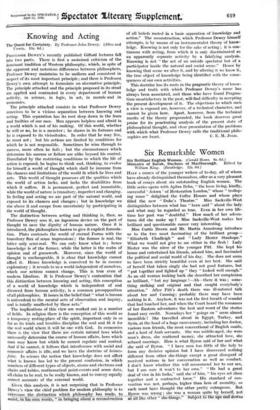Knowing and Acting
The Quest for Certainty. By Professor John Dewey. (Allen and Unwin. 10s. 6d.)
PROFESSOR DEWEY'S recently published Gifford lectures fall into two parts. There is first a sustained criticism of the
dominant tradition of Western philosophy, which, in spite of the apparent and notorious differences between philosophers, Professor Dewey maintains to be uniform and consistent in respect of its most important principle ; and there is Professor, Dewey's own attempt to formulate an alternative principle- The principle attacked and the principle proposed in its stead are applied and contrasted in every department of human activity, in science, in logic, in art, in morals and in economics.
The principle attacked consists in what Professor Dewey conceives to be a vicious separation between knowing and acting. This separation has its root deep down in the fears and frailties of our race. Man appears helpless and afraid in a world which is not of his making. Of this world, whether he will or no, he is a member ; he shares in its fortunes and
he is exposed to its vicissitudes. In order that he may live, he must act ; but his actions are, limited by, conditions for
which he is not responsible. Sometimes he wins through to success, more often he fails ; but the circumstances which determine his success or failure are alike beyond his control.
Humiliated by the restricting conditions to which the life of action is exposed, he begins to think and, thinking, to evolve for himself a world of thought which shall be immune from the chances and limitations of the world ih which he lives and acts. This world of thought possesses all the qualities which the world of action lacks, and lacks the disabilities from which it suffers. It is permanent, perfect and immutable, while the world of nature is transitory, imperfect and changing. In feeling and acting we are part of the natural world, and exposed to its chances and changes ; but in knowledge we rise above it and escape from uncertainty by participating in the world of thought.
The distinction between acting and thinking is, then, as Professor Dewey sees it, an ingenious device on the part of thought to Save the dignity of human nature. Once it is
introduced, the philosophers hasten to give it explicit formula- tion. Plato contrasts the world of eternal Forms with the
transitory flux of sense impressions; the . former is real, the latter only semi-real. We can only know what is ; hence knowledge is of the former, while the latter is the realm of opinion and of guesswork. Moreover, since the world of thought is unchangeable, it is clear that knowledge cannot affect it. Hence knowledge is conceived to be in essence exploratory ; it reveals to us a world independent of ourselves, which our actions cannot change. This is true even of modern Idealism. It is Professor Dewey's contention that this distinction between knowing and acting, this conception of a world of knowledge which is independent of and divorced from human activity, is a common presupposition of all philosophies. It issues in the belief that " what is human is antecedent to the mental acts of observation and inquiry, and is totally unaffected by these acts."
The implications of this view are worked out in a number of fields. In religion there is the conception of this world as a temporary resting-place of the spirit, important only in so far as its trials and troubles discipline the soul and fit it for the real world where it will be one with God. In economics there is the view that there are certain* natural laws which necessarily determine the course of human affairs, laws which man may know but which he cannot regulate and control.
And if he cannot, it follows that interference with social and
economic affairs is idle, and we have the doctrine of laissez- faire. In science the notion that knowledge does not affect what is known has led to the present confusion, in which
numbers of different types of objects, atoms and electrons and chairs and tables, mathematical point-events and sense data, all claim to be real, to be really known, and to convey equally correct accounts of the external world.
Given this analysis, it is not surprising that in Professor Dewey's view the chief problem for modern philosophy is to overcome the distinction which -philosophy has made, to assist, in his own words, " in biinging about a reconstruction of all beliefs rooted in a basic separation of knowledge and action." The reconstruction, which Professor Dewey himself attempts, is by means of an instrumentalist theory of know- ledge. Knowing is not only for the sake of acting ; it is con- tinuous with acting, from which it is only discriminated as an apparently separate activity by a falsifying analysis. Knowing is not " the act of an outside spectator but of a participator inside the natural and social scene." Hence by knowing that scene we alter it, and by altering it we know it, the true object of knowledge being identified with the conse- quences of our own activities.
This doctrine has its roots in the pragmatic theory of know- ledge and truth with which Professor Dewey's name has always been associated, and those who have found Pragma- tism unsatisfactory in the past, will find difficulty in accepting the present development of it. The objections to which such a view is exposed are, however, of a technical character, and cannot be given here. Apart, however, from the technical merits of the theory propounded, the book deserves great praise for its penetrating analysis of the present state of philosophical thought, and clear presentation of the problems with which what Professor Dewey calls the traditional philo-


























































 Previous page
Previous page